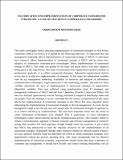| dc.description.abstract | This study investigates factors affecting implementation of turnaround strategies in New Kenya Creameries (NKCC) in Kenya. It is guided by the following objectives: To determine how top management leadership affects implementation of turnaround strategy at NKCC; to determine how resources affects implementation of turnaround strategy at NKCC and to assess how adoption of information communication technologies affects implementation of turnaround strategy at NKCC.This study was guided by the stage and action theory with more emphasis being given to the stage theory. The study conceptualizes that organization experience decline in performance gradually or a sudden unexpected disruption. Substantial organizational decline occurs due to in effective implementation of strategies. In this study the independent variables were be top management leadership, availability of resources and adoption of information communication technologies. Legal framework is the moderating variable. The effect of these variables determines the level of implementation of turnaround strategies in organizations (dependent variable). Data was collected using questionnaires from 43 managers and management employees of NKCC selected from 3 branches. (Nairobi, Limuru and Thika). The data was analyzed quantitatively and the findings presented in frequency distribution tables and bar graphs. From the findings it can be concluded that the factors conceptualized in this study affects the implementation of turnaround strategies at the NKCC.The most important factor influencing the implementation of turnaround strategies is the top management. As such, the top management ought to be efficient and well versed with the turnaround strategies in question so as to ensure efficiency in implementation. The next most important factor was the extent to which information technologies were adopted. This is particularly so since information technologies realize various benefits during the implementation process. This includes: ability to enhance communication, appraisal of human resources and efficient management of resources among other benefits. The least important, though strongly rated was resources. It was evident that NKCC has endeavored to have the requisite resources for the implementation of its turnaround strategies. Regrettably though, these resources needed an efficient human resource. As such, physical facilities could not determine the extent to which turnaround strategies were implemented without the persons attending them. This study recommends that for effective implementation of turnaround strategies, organizations should ensure that there is presence of competent top management. It should have flexible and cordial working relationship with all other employees so as to enhance support of the change process. In terms of resources, the most important resources to be acquired are competent personnel. Furthermore NKCC should also ensure that there is modern equipment and funds to facilitate change management. Government should ensure ease in acquisition of equipment, tax laws be constantly reviewed and lastly enhance specialized higher training so as to encourage availability of higher skilled human resources. | en_US |

